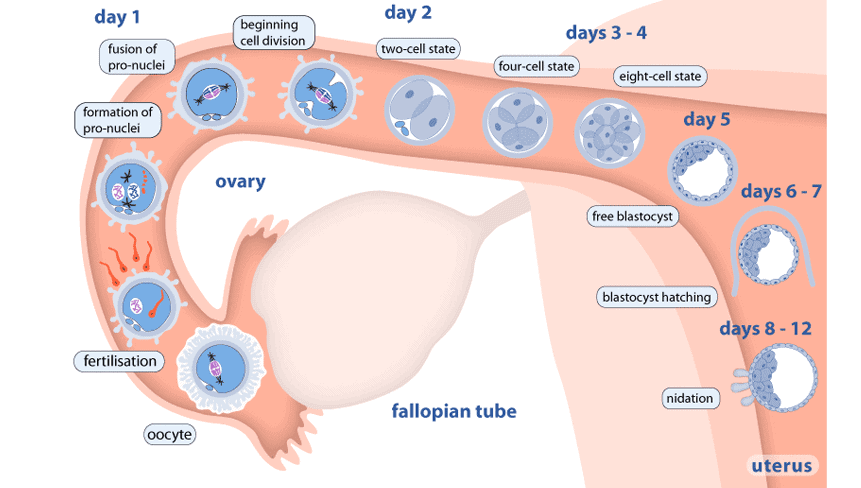Navigating through the labyrinth of early pregnancy can be perplexing, especially in the veil of obscurity that shrouds the first week. Welcoming a baby into the world initiates with tenacious changes that subtly whisper their existence even during this nascent phase. Unravel the mystique around the fascinating first week of pregnancy as we earmark those quiet indicators and churn out handy tips for an exhilarating journey ahead. Let’s demystify day-by-day development, discern potential symptoms that could be your body’s inaugural announcement of this incredible life-altering event, and delve into a world where miracles transpire one cell at a time. Buckle up for an enthralling exploration of what it truly means to be 1-week pregnant!
During the first week of pregnancy, you may experience symptoms similar to premenstrual syndrome (PMS) such as bloating, mood swings, and headaches. However, it’s important to note that at this stage, you are not actually pregnant as it refers to the time of your period. It’s advisable to start preparing for pregnancy by tracking your menstrual cycle, taking prenatal vitamins, and making healthy lifestyle changes. If you suspect that you may be pregnant, it is recommended to consult with a qualified healthcare professional for personalized advice.
Table of Contents
Recognizing Early Pregnancy Symptoms
At 1 week pregnant, you are not actually pregnant yet. This stage refers to the time of your period, and you have not yet conceived. However, it’s still crucial to be alert for early pregnancy symptoms as they can appear as early as one or two weeks before a missed period.
Understanding these early pregnancy symptoms can help you track your menstrual cycle correctly and get a head start on prenatal care. Here we will talk about some physical changes which may indicate that a person is entering into their first week of pregnancy.
Physical Changes
When it comes to physical changes at this point in pregnancy, the indicators can be subtle and vary from woman to woman. Some women may report no noticeable symptoms before their positive pregnancy test, while others experience extreme fatigue, sore breasts and nipples, headaches, vaginal spotting or cramping. The sudden appearance of acne breakout and mood swings is also common during this time.
Keep in mind that most typical PMS symptoms such as bloating, back pain, and cravings can also be indicative of the onset of menstruation rather than pregnancy.
Moreover, it’s important to note that these early signs are not definitive proof of pregnancy, hence a positive test is necessary for confirmation.
If you suspect you may be pregnant, the best course of action would be scheduling an appointment with your physician to address any concerns and receive personalized advice on your specific circumstances.
Sarah had been trying to conceive for months with her husband when she started experiencing nausea at just a few days after conceiving; she even fainted twice at work due to dizziness. While it seemed initially like flu or food poisoning might be contributing factors, she decided to take a test once she missed her period – it was positive! Upon consulting her doctor some days later, Sarah discovered that hers was an unusual case as most women did not exhibit signs so intense as early on in their pregnancies.
Now that we have a general understanding of the physical changes and symptoms associated with the first week of pregnancy, let us delve into emotional transitions in the next section.
Emotional Transitions
Finding out you’re pregnant is likely to bring up a range of emotions and feelings. For some women, it can be a time of excitement and anticipation, while for others, it might be anxiety-inducing or even overwhelming. It’s perfectly normal to experience emotional transitions such as mood swings, anxiety, and fear when trying to conceive or getting pregnant. However, it’s vital to stay positive and find healthy ways to manage these feelings. Some practices that may help include seeking support from loved ones, practicing mindfulness techniques like meditation, yoga or exercise.
One way to manage your emotions could be by finding a supportive community online or in-person. Talking to people who are in the same position as you can help you through the ups and downs associated with pregnancy.
- According to the Mayo Clinic, at one week pregnant, an individual is not technically pregnant yet, rather, they’re in the early stages of their menstrual cycle preparing for potential conception.
- A study published by the National Institutes of Health (NIH) indicates that lifestyle modifications such as quitting smoking and limiting alcohol intake are suggested during this period, as unhealthy habits can reduce fertility rates by up to 25%.
- The American Pregnancy Association states that taking prenatal vitamins at this stage—which contain folic acid—can reduce birth defects of the baby’s brain and spine by approximately 70%.
Understanding the First Week of Pregnancy
Contrary to popular belief, during the first week of pregnancy – which occurs before conception – you’re not actually pregnant yet as this stage refers to the time of your period. The symptoms experienced are a result of PMS, not pregnancy. However, this is a crucial stage when it comes to understanding your body and preparing to conceive.
At this point, the body is preparing for ovulation: releasing an egg from the ovaries into the fallopian tubes where fertilization can occur. Developing healthy reproductive habits during this time may improve your chances of getting pregnant later on.
It’s essential to start preparing for pregnancy during this stage by tracking your cycle, taking prenatal vitamins, and making lifestyle changes. Tracking your menstrual cycle can help determine when ovulation occurs so that you can make use of your fertile window optimally. Prenatal vitamins containing folic acid should be incorporated into your diet since they help reduce birth defects in the fetus’s brain and spine.
Making lifestyle changes like avoiding smoking and excessive drinking beforehand may increase your chances of becoming pregnant while maintaining good health for you and your baby.
It’s crucial to stay informed about the changes happening within your body. That’s why we’ll delve further into the symptoms experienced after fertilization occurs in the coming weeks.
Role of Fertilization
At just one week pregnant, conception has recently occurred. After successful fertilization of the egg by sperm, a single cell is formed known as a zygote. This tiny clustered ball of cells makes its way down the fallopian tube toward the uterus where it will begin to grow and develop into a fetus.
To help visualize the process, think of fertilization like planting a seed in the soil. It takes time before that seed develops into a full-fledged plant capable of producing fruit.
While some women may experience early pregnancy symptoms during this time, it’s also essential to note that many might not feel any noticeable changes until several weeks down the line.
Hormonal and Bodily Changes
Despite not being able to confirm pregnancy through symptoms yet, hormonal changes within the mother’s body are already underway. Elevated levels of estrogen and progesterone begin to deliver signals to different systems in preparation for pregnancy.
The hormones act as project managers, organizing various tasks necessary for long-term success.
These fluctuations can lead to mood changes, fatigue, breast tenderness and increased urination frequency among other symptoms some women may or may not experience. Although these symptoms can be identified as normal for a first week pregnant woman, it is crucial to note that similar reactions can be attributed to PMS – making it important to only confirm pregnancy with a positive test.
While these symptoms might seem unpleasant, they’re all attributes linked with a healthy pregnancy. Nevertheless, there is an array of ways one can minimize these symptoms while increasing their chances of healthy fetal development – which we’ll expound upon in the next section.
Fluctuating Hormone Levels
At one week pregnant, hormonal changes have just begun. The fertilized egg has yet to implant into the uterine lining, and it’s too early to experience any significant changes in your body. However, estrogen and progesterone levels start to rise as the body prepares for pregnancy. These hormones are essential for maintaining a healthy pregnancy by stimulating the growth of the placenta and regulating menstrual cycles. While these hormonal changes can lead to typical PMS symptoms, such as bloating and mood swings, they can also contribute to morning sickness in early pregnancy.
Remember that each woman’s experience with fluctuating hormone levels is unique and may manifest in different ways. It’s essential to pay close attention to your body and report any significant symptoms to your doctor.
- During the first week of pregnancy, hormonal changes are just starting and it’s too early to experience significant bodily changes. However, estrogen and progesterone levels begin to rise, which are crucial for a healthy pregnancy. These hormones stimulate placental growth and regulate menstrual cycles. While these changes can lead to typical PMS symptoms like bloating and mood swings, they can also contribute to morning sickness. It’s important to note that every woman’s experience with hormone fluctuations is unique, so paying attention to your body and reporting any notable symptoms to your doctor is crucial.
Dietary and Lifestyle Adjustments for Pregnancy
Preparing for a healthy pregnancy starts long before conception. Now that you’ve decided to try and conceive, it’s time to make some dietary and lifestyle adjustments.
Firstly, taking prenatal vitamins that include folic acid is critical as it supports the developing fetus’s neural tube development. Folic acid reduces the risk of neural tube defects that can occur during early fetal development.
It’s important to avoid consuming alcohol, tobacco smoking, or using drugs while trying for or carrying a baby. Exposure to chemicals and harmful substances could negatively affect you and your baby’s health.
Your diet also plays an integral role in supporting a healthy pregnancy, eat whole foods rich in nutrients like lean protein, whole grains, fruits, vegetables, nuts, seeds when possible. Avoid processed foods high in preservatives or artificial ingredients. Many doctors also recommend limiting caffeine intake during pregnancy as it can increase miscarriage risks.
On top of making healthier choices when it comes to food options; proper hydration is crucial. Drinking natural juice squeezed from fruits also provides a safe way of keeping up with some of the much-needed nutrients essential for a healthy pregnancy.
Remember, consistency is key as consistent healthy choices over time contribute to improved health in the long run. Making these dietary and lifestyle adjustments can seem challenging initially, but it’s all about taking small steps towards better health for you and your baby.
Think of it like keeping a garden – by providing it with the right amount of sun, water, and nutrients over an extended period, you will enjoy the fruits of your labor in abundance.

Elizabeth Baker is a mother of three, wife, and the passionate mind behind this pregnancy and baby development resource. She balances her love for understanding every stage of child growth with her duties as a parent. When she’s not sharing her experiences or studying child development, Sarah enjoys family time, reading, and practicing yoga. She believes in the power of shared knowledge to enhance the beautiful journey of parenthood. Read more About me.
